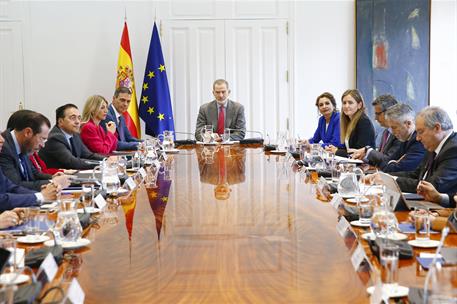Moncloa Palace, Madrid
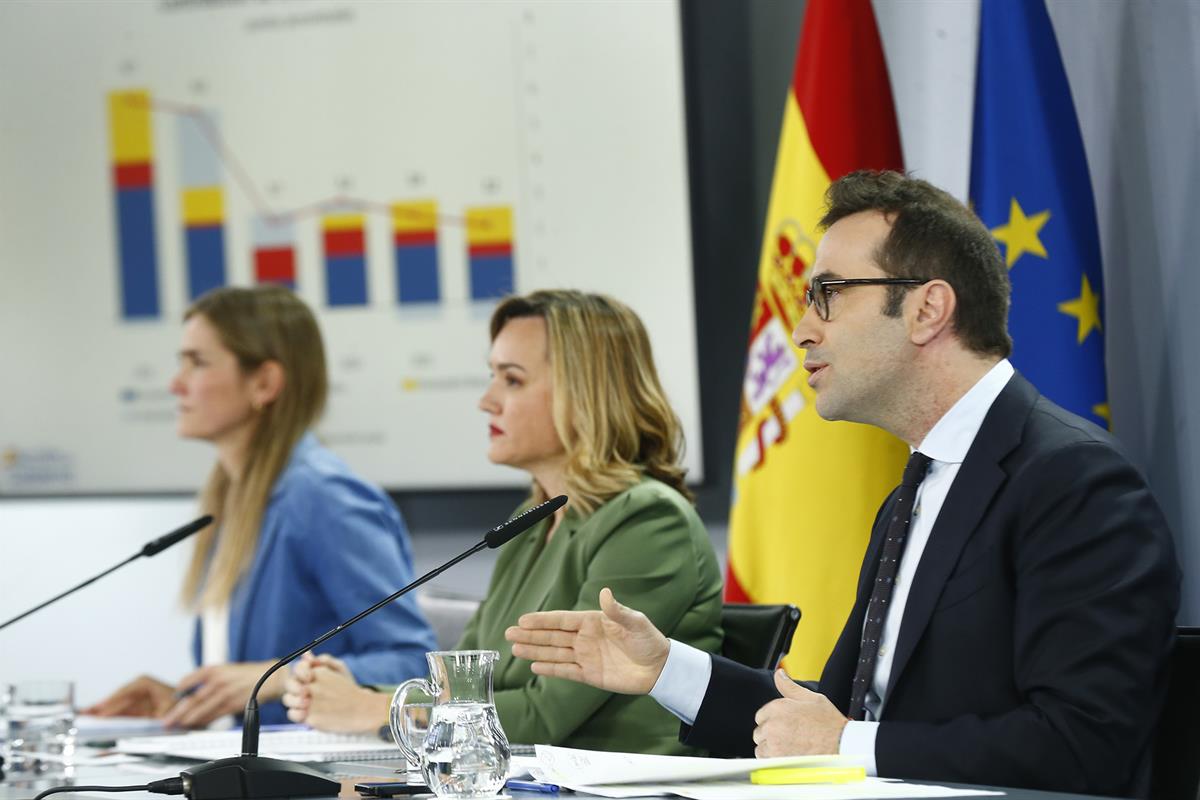 Ministers Sara Aagesen, Pilar Alegría, and Carlos Cuerpo, during the press conference after the Council of Ministers (Pool Moncloa / José Manuel Álvarez)
Ministers Sara Aagesen, Pilar Alegría, and Carlos Cuerpo, during the press conference after the Council of Ministers (Pool Moncloa / José Manuel Álvarez)
The Minister for Economy, Trade and Business, Carlos Cuerpo, presented an annual progress report and update of the macroeconomic framework to the extraordinary Council of Ministers, which will be sent to the European Commission today. The document incorporates the first estimates of the impact of the US tariff policy.
The minister stressed that, despite the huge, complicated and uncertain international geopolitical context and the successive events that have affected the economy in recent months, such as the DANA, the tariff dispute and last Monday's power outage, the outlook for the next four years is favourable and average growth will be above 2.2% between 2025 and 2026. "The Spanish economy maintains its dynamism and will continue to lead growth among the main eurozone economies," he remarked.
This dynamism, argued Cuerpo, allows the Government to keep the economic growth forecast for 2025 at 2.6%, as well as employment growth. Data from the Labour Force Survey for the first quarter of the year confirms that there are 520,000 new employees and that for the first time the figure has exceeded 22 million, in seasonally adjusted terms, according to the minister. Moreover, he said, employment is higher quality and temporary employment has been reduced to around 15%, in line with European figures.
The Executive therefore keeps its projection of creating some 480,000 jobs on average per year over the next four years, which will reduce the unemployment rate to below 10% in 2026 and to below 9% by the end of 2028. In the minister's opinion, it is a "figure close to full employment and would be on a par with the best figures we experienced during the construction boom, in the previous expansionary economic cycle, but now achieved without macroeconomic imbalances, but rather in a structural and permanent manner."
Carlos Cuerpo has stated that the growth in employment will be accompanied by a progressive increase in salaries above prices, which means an improvement in the purchasing power of citizens, as has been the case in recent years.
Factors underpinning economic growth
 The Minister for Economy, Trade and Business, Carlos Cuerpo, during his speech at the press conference after the Council of Ministers | Pool Moncloa / Fernando Calvo
The Minister for Economy, Trade and Business, Carlos Cuerpo, during his speech at the press conference after the Council of Ministers | Pool Moncloa / Fernando Calvo
The minister explained that two factors are at the centre of the forecasts for 2025 and 2026: domestic demand - led by private consumption - and investment.
Compared with the previous macroeconomic picture, updated in February, the document presented today incorporates the impact of the rise in tariffs, which will reduce the contribution of the foreign sector to economic growth by one tenth of a percentage point, although this growth will be offset by the increase in private consumption, also by one tenth of a percentage point, so that the Executive's forecasts remain unchanged.
The minister also stressed that the strong growth in employment is occurring "compatibly and in parallel" with a sustained increase in productivity. This positive contribution of both elements, according to the minister, did not usually occur in previous stages of growth in our economy and is an element that contributes favourably to the increase in Gross Domestic Product. Carlos Cuerpo also pointed out that the Recovery, Transformation and Resilience Plan "is contributing to this combined improvement in employment and productivity."
Balanced growth compatible with fiscal commitments
On the budget, the Government keeps its commitment and maintains its deficit target of 2.5% and debt target of 101.7% in 2025. Carlos Cuerpo has detailed that the 2.5% deficit means that "once we take interest expenditure on the debt out of the equation, we will be in a budget surplus."
Normality and stability of the electricity system
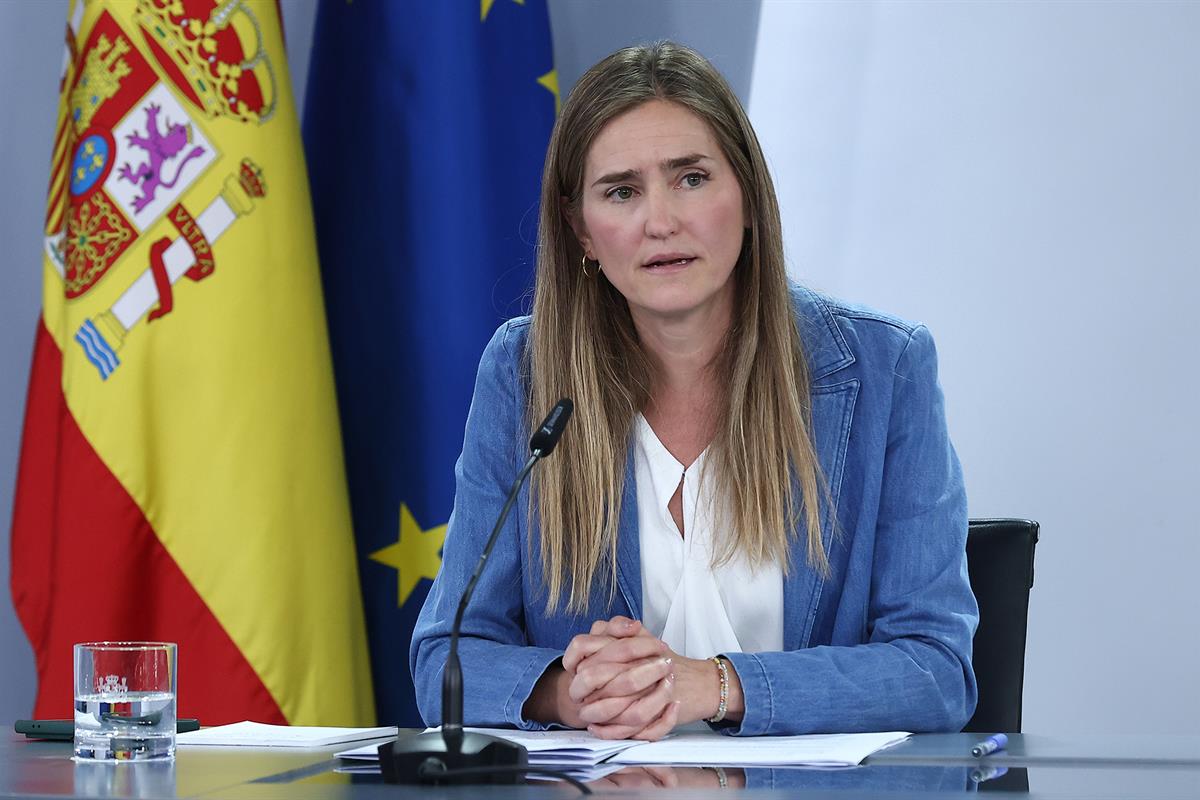 The Third Vice-President of the Government of Spain and Minister for Ecological Transition and Demographic Challenge, Sara Aagesen, speaks at the press conference following the Council of Ministers | Pool Moncloa / Fernando Calvo
The Third Vice-President of the Government of Spain and Minister for Ecological Transition and Demographic Challenge, Sara Aagesen, speaks at the press conference following the Council of Ministers | Pool Moncloa / Fernando Calvo
At the Council of Ministers press conference, the Third Vice-President of the Government of Spain and Minister for Ecological Transition and Demographic Challenge, Sara Aagesen, who also participated in the previous meeting of the National Security Council, updated information on Monday's electricity crisis.
"The electricity system has been operating under normal and stable conditions since yesterday," said the third vice-president. The supply, she added, was fully restored yesterday, although the Ministry is aware that there are still breakdowns, impacts and incidents caused by the electricity crisis.
Orderly and gradual recovery of supply
Sara Aagesen detailed that her department declared the "electricity crisis" from the moment of the "national zero", the general power cut, in accordance with the electricity system risk preparedness plan. From that moment on, all the efforts of the Executive have been focused on the recovery of supply, a process that is not improvised either, but is carried out following the protocols and simulations carried out by the operators and Red Eléctrica.
According to the vice-president, the rebuilding began thanks to the interconnections with France and Morocco and, once the voltage was restored, the facilities that have the capacity for autonomous start-up, such as the hydroelectric power stations, were also used. "What is done is a gradual, progressive advance, we call it 'in islands': little by little, the different nuclei where this energy originates advance until they interconnect with each other," she said.
By 4 a.m. on Tuesday morning, all substations of the transmission network were available, and by 7 a.m. 99.95% of the supply had been restored. Yesterday the connection between the mainland and the Balearic Islands was also restored and the emergency level was deactivated. "We have worked with the utmost diligence and agility, it is something historic, it has never happened before that supply can be restored in such a short space of time," said the minister, who thanked the ministries, the agents of the electricity system, the technical workers, the security forces and the administrations, as well as the exemplary response of the public.
Security of the rest of the energy system
Sara Aagesen highlighted the "total normality" with which the rest of the energy system functioned during the blackout. The gas supply was secured, and all nuclear power plants activated their emergency plans.
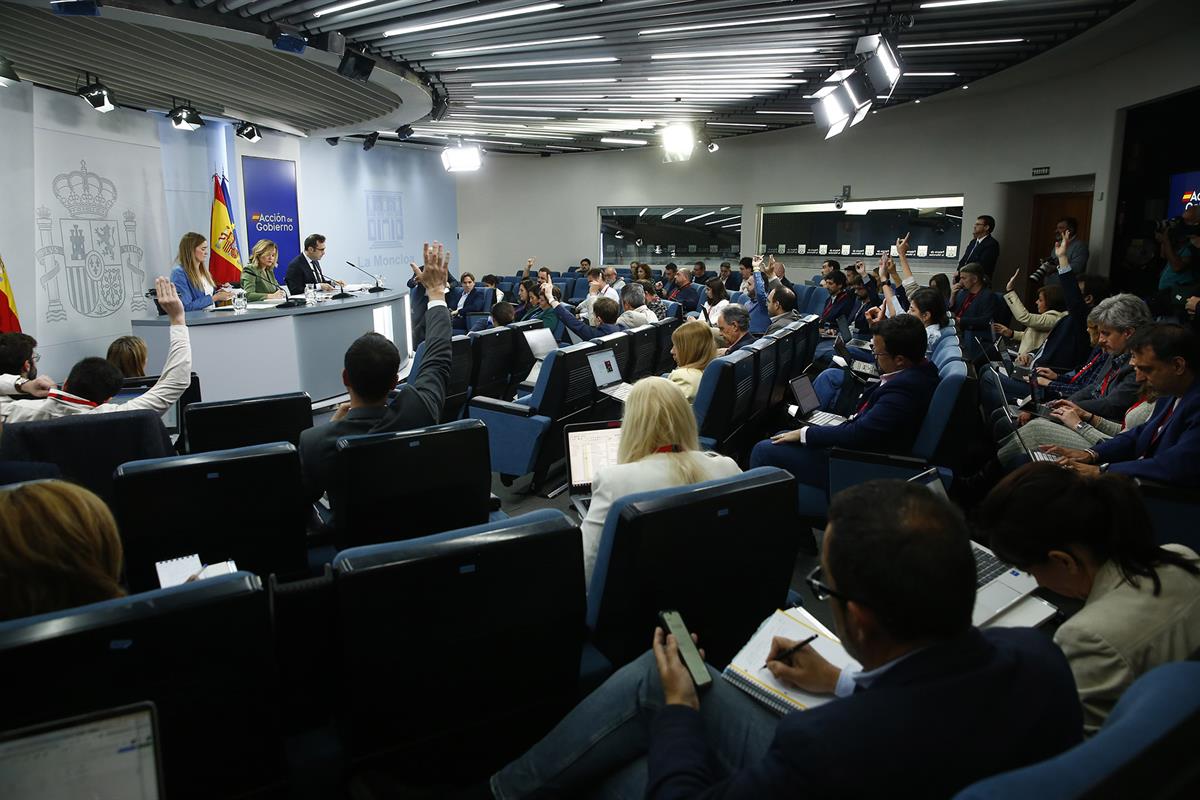 A moment during question time at the press conference following the Council of Ministers | Pool Moncloa / José Manuel Álvarez
A moment during question time at the press conference following the Council of Ministers | Pool Moncloa / José Manuel Álvarez
With regard to hydrocarbons, the vice-president recalled that the Council of Ministers yesterday authorised the release of part of the strategic reserves to cover the possible need for additional supplies.
Taking action following a rigorous audit
Regarding the source of the crisis, Aagesen stressed the interest of the Government, the operators and the public as a whole in finding out the cause of the incident in order to "put all the necessary measures on the table so that this does not happen again." The vice-president pointed out that the electricity system is complex, it is interconnected with the rest of Europe and needs to balance supply and demand at all times. "Any disturbance has an impact and can be transmitted almost instantaneously," she said.
The Ministry of Ecological Transition and Demographic Challenge, as explained by its head, is compiling "thousands and thousands of bits of data" from the agents of the electricity system, especially on the five seconds in which there was a large loss of generation in the system. The Government's obligation, it stressed, is to provide truthful and exhaustive information about what happened, with the utmost transparency.
Along these lines, the National Security Council has agreed to create an independent analysis committee, led by Transición Ecológica and made up of the Presidency of the Government and various ministries and entities. This committee, which will also include experts and the support of the National Markets and Competition Commission, will meet for the first time today.
The third vice-president stated that, when the crisis began, the contribution of the different generation sources was similar to that recorded on other days, so instead of speculating, a rigorous technical analysis should be undertaken. "Spain has always had a robust system that has been identified as fundamental by international institutions. We understand that this will be an isolated incident and we will take all necessary measures to ensure that it does not happen again," said Aagesen.
Extension of administrative deadlines due to the blackout
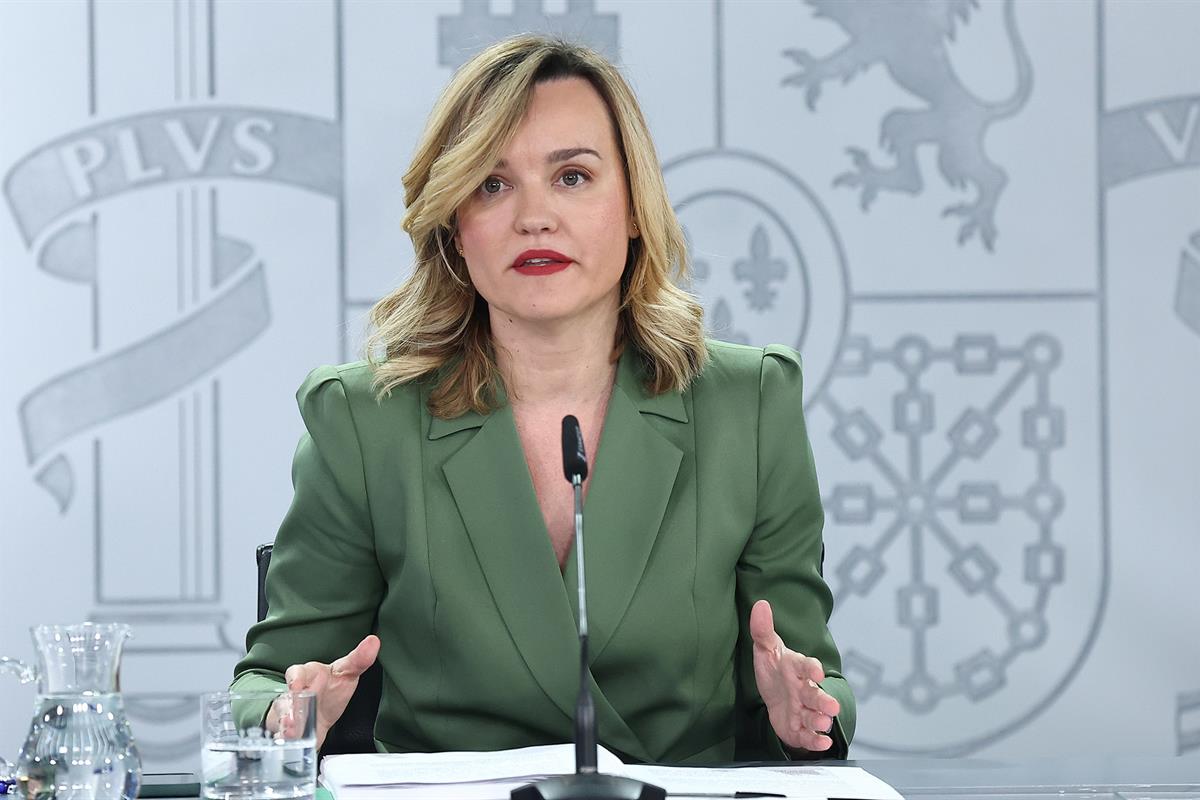 The Minister for Education, Vocational Training and Sports and Government Spokesperson, Pilar Alegría, during her speech at the press conference after the Council of Ministers | Pool Moncloa / Fernando Calvo
The Minister for Education, Vocational Training and Sports and Government Spokesperson, Pilar Alegría, during her speech at the press conference after the Council of Ministers | Pool Moncloa / Fernando Calvo
The Minister for Education, Vocational Training and Sports and Government Spokesperson, Pilar Alegría, has informed that the Council of Ministers has approved an extension of administrative deadlines due to the situation caused by the interruption of the electricity supply on 28 April. As Alegría has confirmed, in those cases in which they may have been affected, the deadlines will be extended until 6 May.
The government spokesperson recalled that the National Security Council has met on six extraordinary occasions since the blackout to monitor the situations that have arisen. Once normality was restored, Alegría continued, the Situation Committee was set up, chaired by the Minister for the Presidency, Justice and Parliamentary Relations, Félix Bolaños.
On this point, like the Minister for Ecological Transition, Pilar Alegría stressed "the strength and responsiveness of the system" and reiterated the Government's gratitude to all institutions, public servants, workers and citizens for their help in dealing with the electricity crisis.
Non official translation





